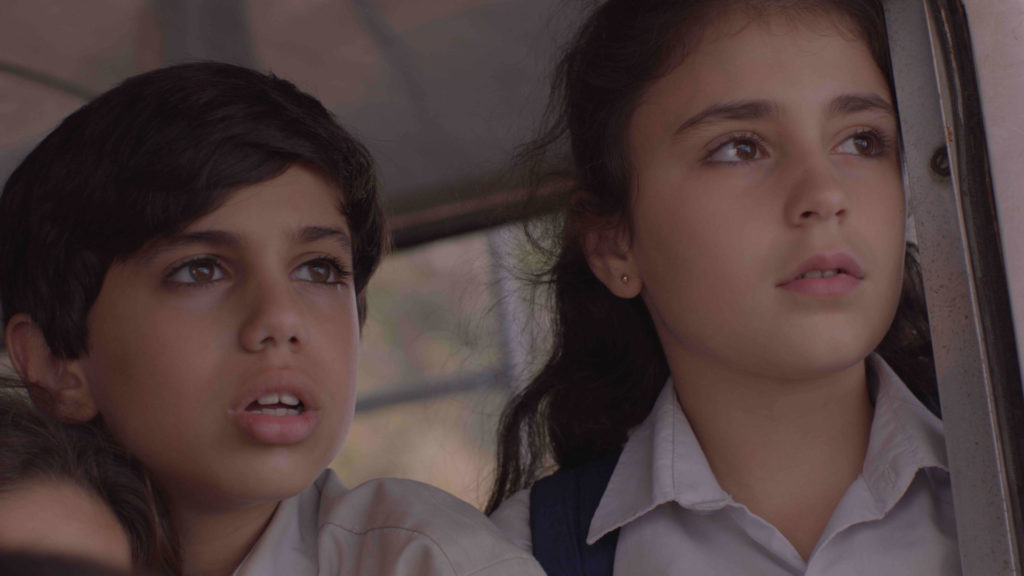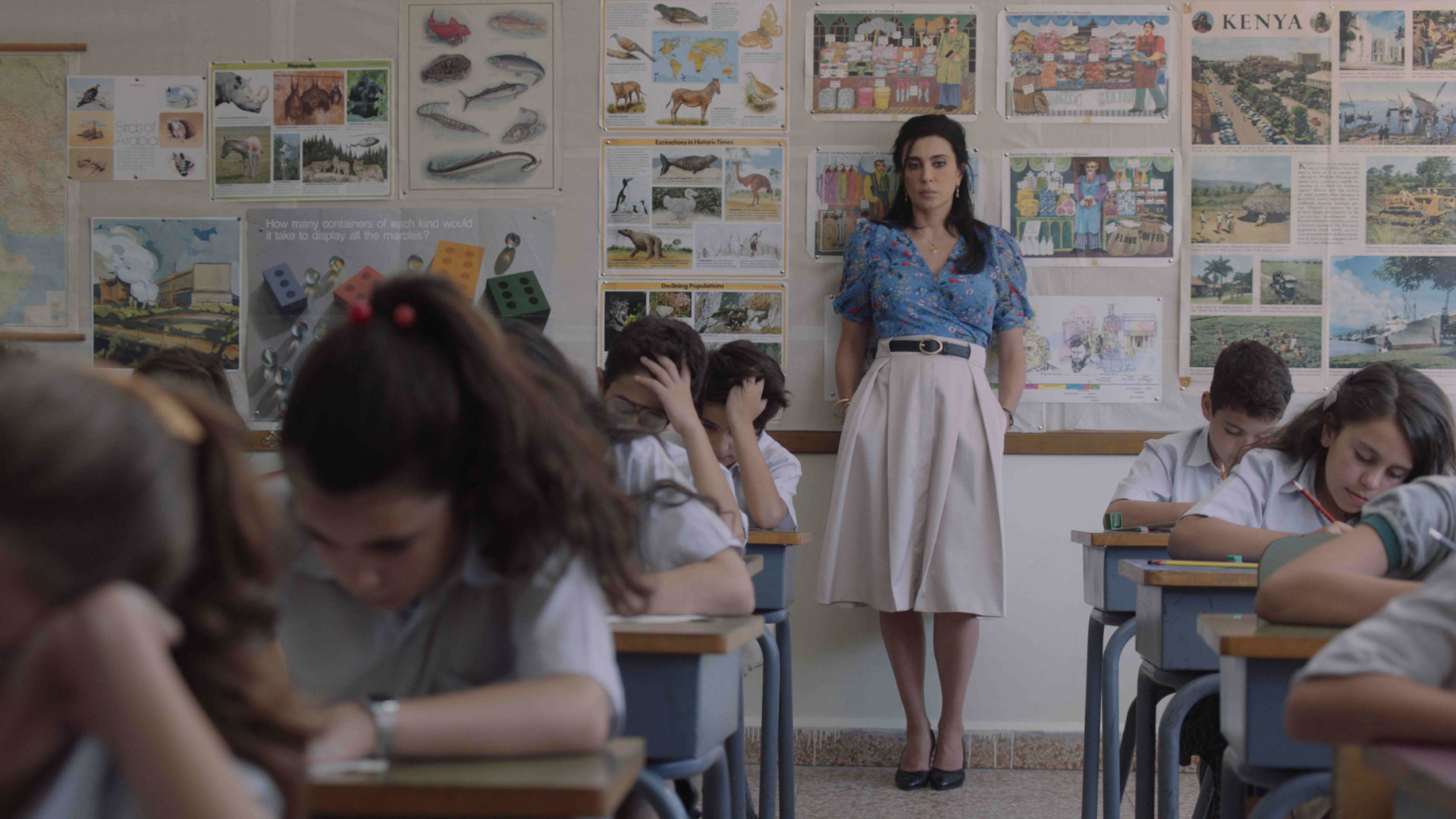In Oualid Mouaness’ debut, feature-length film “1982,” war arrives as a pigeon on a windowsill. It is the end of the school year in the Lebanese highlands, and primary school students are taking their final exams. Amid the silence of the classroom, perforated by the sounds of erasers on paper and the click of the teacher’s heels, the birds arrive one by one, capturing the attention of students unaccustomed to their presence. Strange animal behavior often portends disaster, and despite the banality of the exam room, a tension takes root.
The film, which opened in select theaters in the U.S. in mid-June, takes place in 1982, six years into the Lebanese Civil War. In previous years, the fighting had been concentrated in the south of the country, where Christian militias battled a coalition of leftist groups aligned with the Palestine Liberation Organization. But in the summer of 1982, Israel invaded Lebanon from the south, advancing along the coastline to the outskirts of Beirut. Parts of the country that had been shielded from the worst of the fighting saw their skies fill with warplanes and felt the shudders of bombardment close to home.
Mouaness tells this chapter of Lebanese history from the idyllic grounds of a primary school in the mountains near Beirut, where the drama of the invasion is eclipsed by the preoccupations of schoolchildren. In particular, an 11-year-old boy named Wissam (Mohamad Dalli) is trying to work up the courage to tell his classmate Joanna (Gia Madi) that he is in love with her. As the plot of Wissam’s love story thickens, the sound of the bombing grows louder. The teacher, Yasmine (Nadine Labaki), who appears to be in denial of the conflict’s rapid escalation, repeatedly tells her class that they have nothing to worry about: “What’s happening outside doesn’t concern us.”
Eventually, however, the noise can no longer be ignored: One student begins to weep while working on her test. Another tells Yasmine to keep the windows open in case the glass shatters from a nearby bombing. When a diesel depot down the mountain is finally hit, students rush to the window to watch a plume of smoke rise above the trees. The din of fighter jets grows so loud that we can no longer hear Yasmine shouting at the students to return to their seats.
The use of sound is Mouaness’ greatest feat and sets “1982” apart from other movies about the Lebanese Civil War. Over the course of the film’s 1 hour and 40 minutes, there are no appearances of uniformed soldiers or sandbag-lined checkpoints. Rather, it is sound that is the aggressor that animates the characters and gives the film its urgent momentum.

“1982” was inspired by Mouaness’ own memories of the invasion, which took place when he was a schoolkid (the set of the film is actually on the campus of his old high school in Broummana, a village in Mount Lebanon). Like the school Mouaness attended, the one in “1982” welcomes students of all religious backgrounds, a fact that helps create polemic tension in a film mostly centered on the lives of children. When Wissam’s best friend, Majd, warns him that his crush might be Muslim since she takes the bus from predominantly Muslim West Beirut, he quickly retorts, “It doesn’t matter.” In other scenes, too, we watch the students attempt to sidestep the red tape of institutionalized sectarianism.
It is clear the students understand the seriousness of these divides that helped create the war, and yet there are lapses in judgment, moments of cognitive dissonance that can only be explained by the innocence of childhood. While Majd is obviously afraid of the bombing, he expresses excitement that school will be canceled the next day. Later, as he climbs into his mother’s car, he yells after Wissam that he’ll see him at the beach. Summer in Lebanon means long days by the sea with friends and family, eating fried fish and playing ball. But the country’s summers are also associated with bloody, drawn-out wars. In moments like Majd’s farewell, Mouaness reminds us that trauma comes later, that the students’ bewilderment at the events unfolding around them may someday be replaced with the pain of unresolved memories.
Today, the events of the Lebanese Civil War are not taught in the country’s schools. Most Lebanese history books stop at 1943, the year Lebanon gained its independence from France. This is, of course, by design: Competing narratives of the conflict have implications for the sectarian political groups vying for power in Lebanon today. In a talk at Quad Cinema in Manhattan in early June, Mouaness said that the taboo associated with the Israeli invasion, in particular, made it difficult to pitch his film to investors. “Why would you want to make a film about 1982?” he was asked repeatedly. After five years of fundraising and an additional two years of filming and post-production, Mouaness’ distributor had to fight to get the film into Lebanon, where authorities tried to make it an R-rated movie.
The reluctance of investors and authorities in Lebanon to support “1982” underscores the lasting effect of the Israeli invasion on multiple generations of Lebanese. Watching the camera pan over the lush forests of Mount Lebanon and linger over the serene school grounds, however, it is difficult not to reflect on the wider implications of such a film. With the recent rumblings about a new war between Israel and Lebanon over maritime border disputes, “1982” asks viewers to consider not only war itself but also the comparative quiet of the moments before its outbreak — not only the bombing but also the routineness of the lives that it disrupts and the cruel obligation of ordinary people to respond to it.



